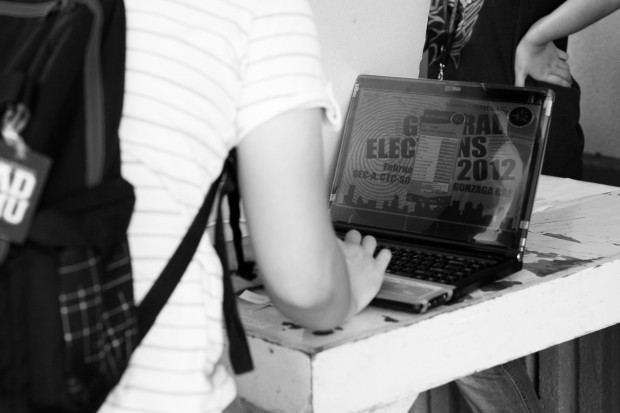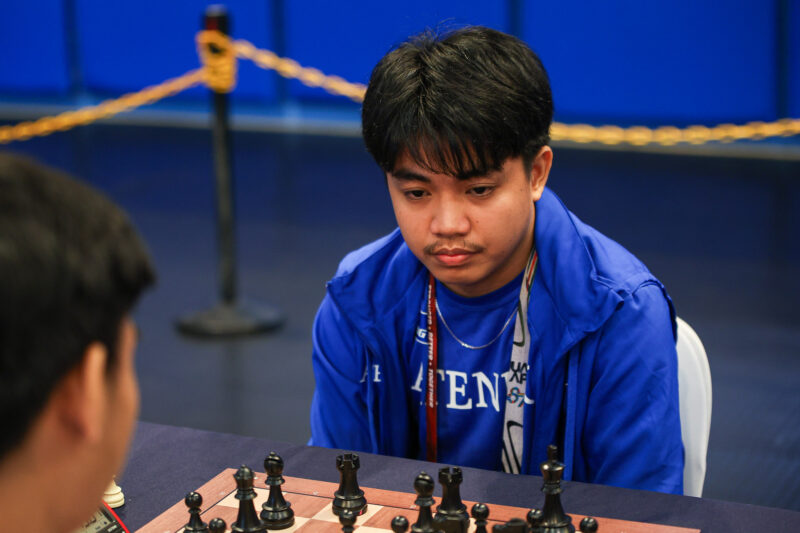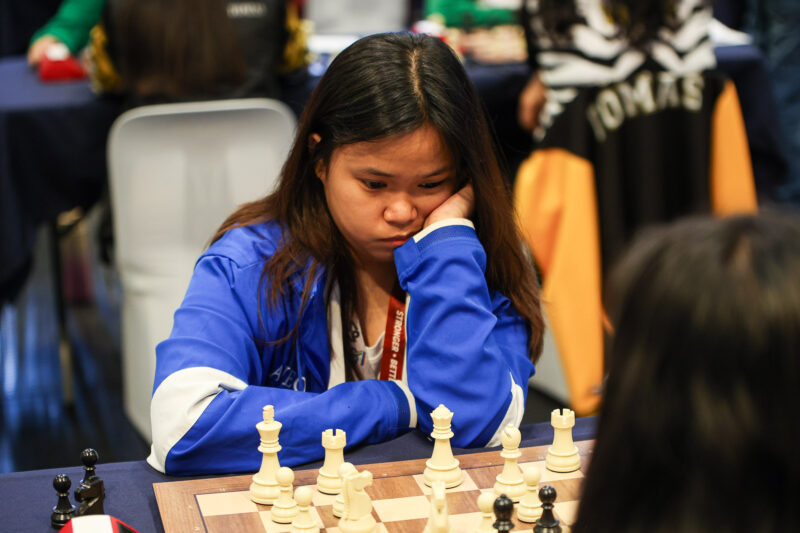
Inclusion. Through absentee voting, JTA students were able to participate in campus politics back home, albeit with mixed results. Photo by Abram P. Barrameda
FOR A number of Ateneans currently participating in the Junior Term Abroad (JTA) program, the news of absentee voting for the Sanggunian General Elections came almost too late.
In the recently concluded elections, held last February 14 to 17, JTA students were allowed to cast their ballots until the noon of February 19. The Ateneo Commission on Elections (Comelec) emailed 40 JTA students, of which only 24 cast their votes. Two ballots, however, were nullified.
Several JTA students raised concerns that they were not properly informed of their voting rights until a few days before the elections.
John Aquilino de Lima, who spent his second semester at the National University of Singapore (NUS), posted a message on the Facebook group Sanggu Bantay Halalan to ask if the proposed absentee voting system for JTA students would push through. This was a follow-up to an earlier question posted by Josh Lim, who is currently on a leave of absence, last January 26.
Comelec only released the memo for absentee voting on February 17, the last day of the physical elections.
Rushed implementation?
Miguel Luigi Calayag, who studied in NUS, said that he only learned about the absentee voting system on February 15 and had it confirmed only later.
“In a way, the lack of [Comelec’s] response took some of us off guard. The general, yet admittedly unwise assumption was, there was no system in place for JTA absentee voting,” he said.
Meanwhile, Brian Llamanzares, who took his term in Fordham University, only got confirmation when de Lima brought it up online.
He said that despite the late progress of the absentee voting, it was better than not having been implemented at all.
“I didn’t really have any problems with the way the absentee voting was conducted. I was actually happy they [Comelec] got back to us regarding our concerns as quickly as possible,” he said.
The only two problems he wished the Comelec could fix next time were information dissemination and efficiency in acquiring JTA students’ records.
While Llamanzares was appreciative of the last-minute efforts of Comelec, Calayag complained about its lack of visibility in the Ateneo community.
“[There] should have been prior notice that efforts were, in fact, in the works for the implementation of a system of JTA [absentee voting],” Calayag said.
“Comelec should have made its presence more felt among the students especially in Sanggu Bantay Halalan 2011 where campus issues abound,” he added.
“Their lack of assertion is indicative of their lack of understanding of their own importance as an institution of campus democratization,” Calayag stressed.
Preparation difficulties
Comelec Commissioner Mary Kryslette Bunyi explained that the poll body had sent letters last February 3 to the four Loyola Schools requesting for JTA student information. The list of JTA students would comprise their official absentee voters list.
The School of Humanities (SOH) sent information last February 8. The School of Science and Engineering (SOSE) reported having no JTA students, while the School of Management (SOM) declined the request, she said.
The School of Social Sciences (SOSS) was not able to give information even until the week of elections, Bunyi said. SOSS passed the request to the JTA coordinator, whom Comelec found out was unavailable until February 24.
On February 17, Comelec obtained all JTA students’ contact information from the Office of International Relations (OIR).
The poll body then sent out emails to all JTA students last February 17. Two emails were sent: one which contained the voters’ manual and an explanation of the absentee voting system, and the second containing a voting form on Microsoft Excel.
SOH JTA students, however, were emailed five days earlier. They were sent the voters’ manual and a link to the voting form on Google Documents.
The form was taken down early on for “unknown reasons,” Commissioner Zedrick Torres said, which prompted Comelec to re-do the voting form through an Excel file.
Commissioner Erinne Baniaga said that many had been asking about the possibility of absentee voting as early as last year. “Many were asking if we could make provisions for JTA students, so we did make a way for them to vote,” she said in Filipino.
Importance of inclusion
Chief Commissioner Jasmine Leaño said that this is the first time Comelec held the absentee voting.
In a memo released last February 17, the poll body noted that JTA students have rights to vote, according to Article VII of the Amended Electoral Code 2011. Voting period was then extended and the release of election results was subsequently moved to February 20 instead of February 18.
Asked if Comelec thought of implementing absentee voting before people started asking about its possibility, Torres said that they did not consider it then. Commissioner Nina Castrillo explained in a mix of English and Filipino, “We’re more concerned about the sanctity of the vote. That is why we never did it.” She added that email is not a surefire way to safeguard privacy.
But when asked how they were able to overcome privacy concerns, Baniaga said that email was still a relatively safer way to conduct electoral transactions.
The commissioners noted that the absentee voting system was especially crucial in the case of SOH, where votes make a big impact due to its small population.
Despite the late announcement of voting guidelines, JTA students still considered the system valuable for their participation in campus politics back home.
“We can only call our system democratic if everyone is given the opportunity to represent themselves no matter how small the group of students is,” said Llamanzares.
Editor’s Note: John Aquilino de Lima is a member of The GUIDON.







